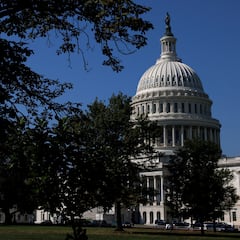When is the next possible government shutdown deadline and how can it be avoided?
The US Senate is back in session facing a new budget battle that could end in a government shutdown if the House and Senate fail to agree on spending bills.


The Senate is in session after the summer recess, and it is facing a new fight over government funding. If the House and Senate are unable to agree on any of the 12 spending measures that are on the table in a couple of weeks, a government shutdown could take place as federal agencies run out of cash at the end of this month.
READ ALSO: What does a government shutdown mean and when was the last?
COVID hits the U.S. Senate… @SenDuckworth says she tested positive today and is experiencing mild symptoms.
— Julie Tsirkin (@JulieNBCNews) September 10, 2023
Additional positive tests among lawmakers over the next few weeks could complicate efforts to avoid a government shutdown at the end of the month. https://t.co/d1b2upHEXC
What is a government shutdown and how can it be avoided?
A shutdown takes place when the federal government’s funding for its discretionary spending programs expires (in this case, on September 30), and Congress has not passed a budget or a continuing resolution (CR) to fund government operations.
This means that various federal agencies and departments do not have the necessary funds to continue their regular functions, and many non-essential government employees are furloughed or placed on temporary unpaid leave.
There is the possibility of Congress passing a short-term bill so a shutdown can be avoided after the September 30 deadline passes. If both houses are able to come up with a CR, government agencies can continue to receive funds at existing levels. However, even a short-term solution is seen to be difficult to achieve.
READ ALSO: How many terrorist attacks have there been in the US since 9/11?
Former GOP House Majority Leader Eric Cantor was at the center of the 2013 government shutdown.
— POLITICO (@politico) September 11, 2023
His advice for Republican colleagues ahead of another potential shutdown 10 years later: Don’t do it again. https://t.co/VgsiWaiTHk
What part of the government are affected by a shutdown?
The most common areas affected by a government shutdown include national parks and monuments, federal research agencies, immigration services, among others.
Related stories
During a shutdown, essential services like national defense, law enforcement, and emergency response continue to operate, but non-essential functions are scaled back or put on hold. The length of a shutdown can vary, as it depends on when Congress can reach an agreement on funding.
Government shutdowns can have significant economic and social impacts, affecting government employees, contractors, and the general public.

